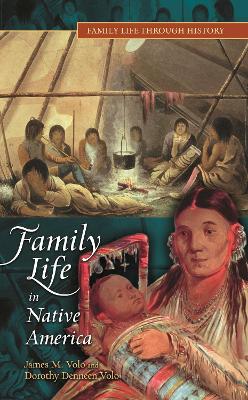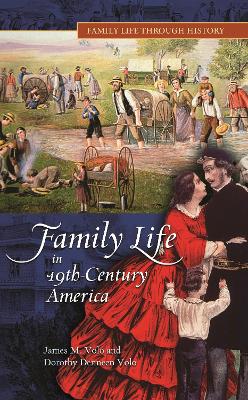Family Life Through History
3 total works
This volume provides insight into the family life of Native Americans of the northeast quadrant of the North American continent and those living in the adjacent coastal and piedmont regions. These Native Americans were among the most familiar to Euro-colonials for more than two centuries. From the tribes of the northeast woodlands came "great hunters, fishermen, farmers and fighters, as well as the most powerful and sophisticated Indian nation north of Mexico [the Iroquois Confederacy].
Family Life in 17th- And 18th-Century America
by James M Volo and Dorothy Denneen Volo
Colonial America comes alive in this depiction of the daily lives of families-mothers, fathers, children, and grandparents. The Volo's examine the role of the family in society and typical family life in 17th- and 18th-century America. Through narrative chapters, aspects of family life are discussed in depth such as maintaining the household, work, entertainment, death and dying, ceremonies and holidays, customs and rites of passage, parenting, education, and widowhood. Readers will gain an in-depth understanding of the world in which these families lived and how that world affected their lives. Also included are sources for further information and a timeline of historic events.
Volumes in the Family Life through History series focus on the day-to-day lives and roles of families throughout history. The roles of all family members are defined and information on daily family life, the role of the family in society, and the ever-changing definition of family are discussed. Discussion of the nuclear family, single parent homes, foster and adoptive families, stepfamilies, and gay and lesbian families are included where appropriate. Topics such as meal planning, homes, entertainment and celebrations are discussed along with larger social issues that originate in the home, such as domestic violence, child abuse and neglect, and divorce. Ideal for students and general readers alike, books in this series bring the history of everyday people to life.
Family Life in 19th-Century America
by James M Volo and Dorothy Denneen Volo
Nineteenth century families had to deal with enormous changes in almost all of life's categories. The first generation of nineteenth century Americans was generally anxious to remove the Anglo from their Anglo-Americanism. The generation that grew up in Jacksonian America matured during a period of nationalism, egalitarianism, and widespread reformism. Finally, the generation of the pre-war decades was innately diverse in terms of their ethnic backgrounds, employment, social class, education, language, customs, and religion. Americans were acutely aware of the need to create a stable and cohesive society firmly founded on the family and traditional family values. Yet the people of America were among the most mobile and diverse on earth. Geographically, socially, and economically, Americans (and those immigrants who wished to be Americans) were dedicated to change, movement, and progress. This dichotomy between tradition and change may have been the most durable and common of American traits, and it was a difficult quality to circumvent when trying to form a unified national persona.
Volumes in the Family Life in America series focus on the day-to-day lives and roles of families throughout history. The roles of all family members are defined and information on daily family life, the role of the family in society, and the ever-changing definition of family are discussed. Discussion of the nuclear family, single parent homes, foster and adoptive families, stepfamilies, and gay and lesbian families are included where appropriate. Topics such as meal planning, homes, entertainment and celebrations, are discussed along with larger social issues that originate in the home like domestic violence, child abuse and neglect, and divorce. Ideal for students and general readers alike, books in this series bring the history of everyday people to life.


